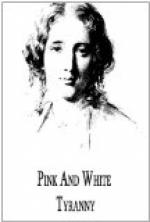Like most good boys who grow into good men, John had unlimited faith in women. Whatever little defects and flaws they might have, still at heart he supposed they were all of the same substratum as his mother and sister. The moment a woman was married, he imagined that all the lovely domestic graces would spring up in her, no matter what might have been her previous disadvantages, merely because she was a woman. He had no doubt of the usual orthodox oak-and-ivy theory in relation to man and woman; and that his wife, when he got one, would be the clinging ivy that would bend her flexible tendrils in the way his strong will and wisdom directed. He had never, perhaps, seen, in southern regions, a fine tree completely smothered and killed in the embraces of a gay, flaunting parasite; and so received no warning from vegetable analogies.
Somehow or other, he was persuaded, he should gradually bring his wife to all his own ways of thinking, and all his schemes and plans and opinions. This might, he thought, be difficult, were she one of the pronounced, strong-minded sort, accustomed to thinking and judging for herself. Such a one, he could easily imagine, there might be a risk in encountering in the close intimacy of domestic life. Even in his dealings with his sister, he was made aware of a force of character and a vigor of intellect that sometimes made the carrying of his own way over hers a matter of some difficulty. Were it not that Grace was the best of women, and her ways always the very best of ways, John was not so sure but that she might prove a little too masterful for him.
But this lovely bit of pink and white; this downy, gauzy, airy little elf; this creature, so slim and slender and unsubstantial,—surely he need have no fear that he could not mould and control and manage her? Oh, no! He imagined her melting, like a moon-beam, into all manner of sweet compliances, becoming an image and reflection of his own better self; and repeated to himself the lines of Wordsworth,—
“I saw her, on a nearer view,
A spirit, yet a woman too,—
Her household motions light and free,
And steps of virgin liberty.
A creature not too bright or good
For human nature’s daily food,
For transient pleasures, simple wiles,
Praise, blame, love, kisses, tears, and
smiles.”
John fancied he saw his little Lillie subdued into a pattern wife, weaned from fashionable follies, eagerly seeking mental improvement under his guidance, and joining him and Grace in all sorts of edifying works and ways.
The reader may see, from the conversations we have detailed, that nothing was farther from Lillie’s intentions than any such conformity.
The intentions of the married pair, in fact, ran exactly contrary to one another. John meant to bring Lillie to a sober, rational, useful family life; and Lillie meant to run a career of fashionable display, and make John pay for it.




